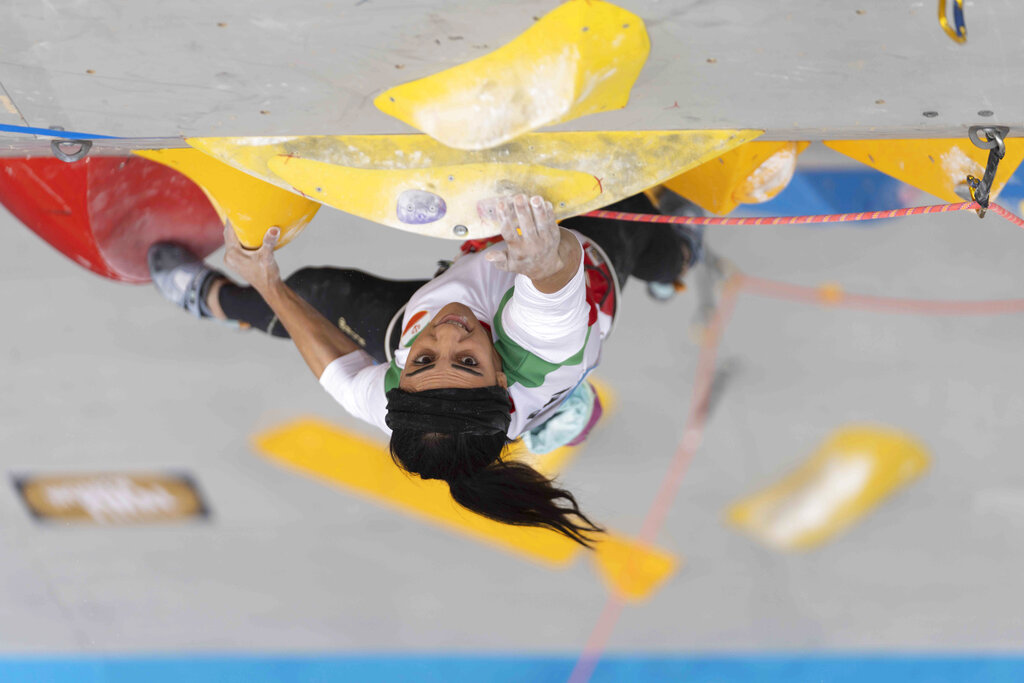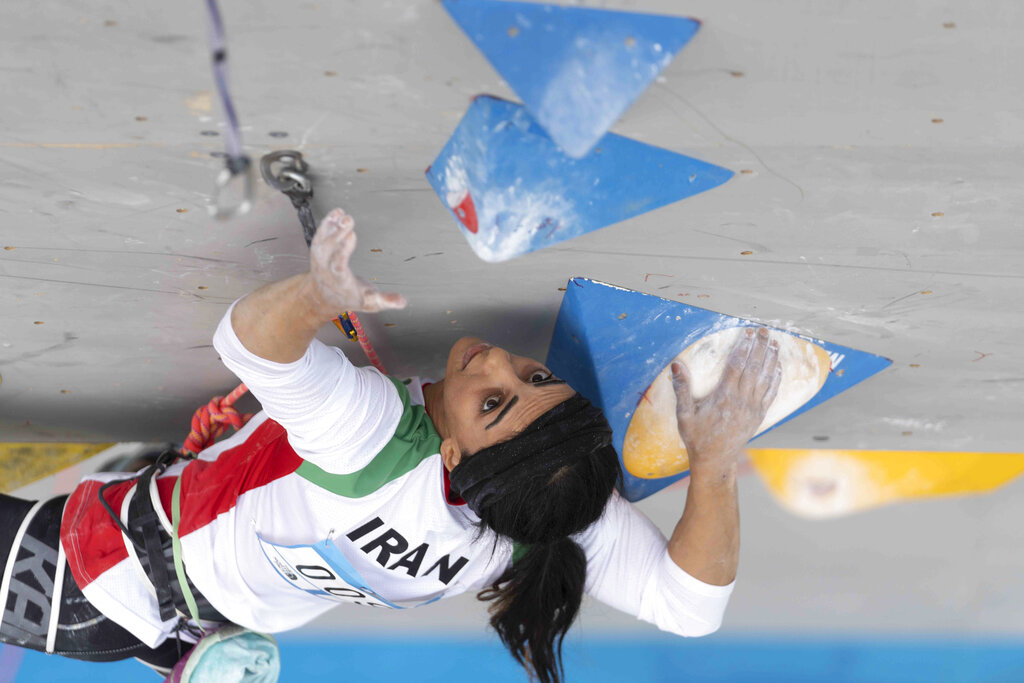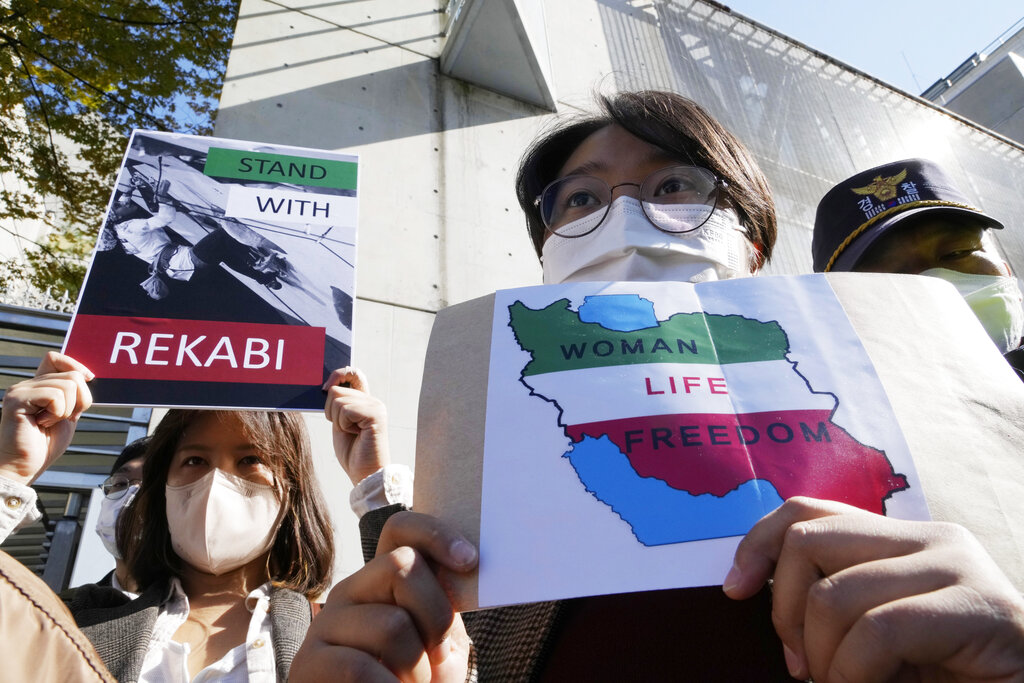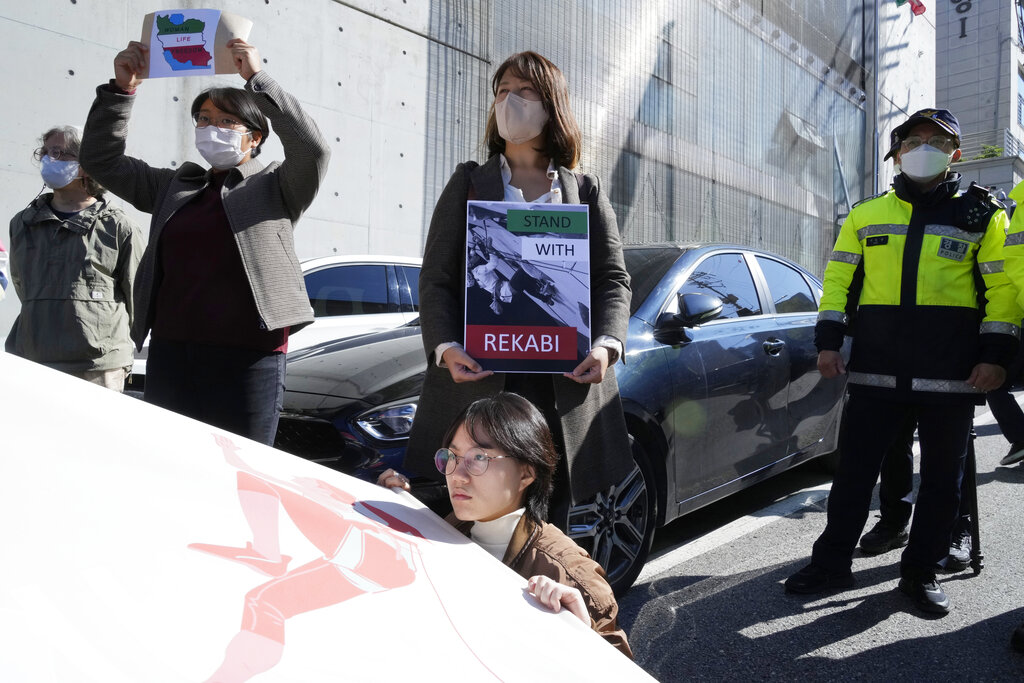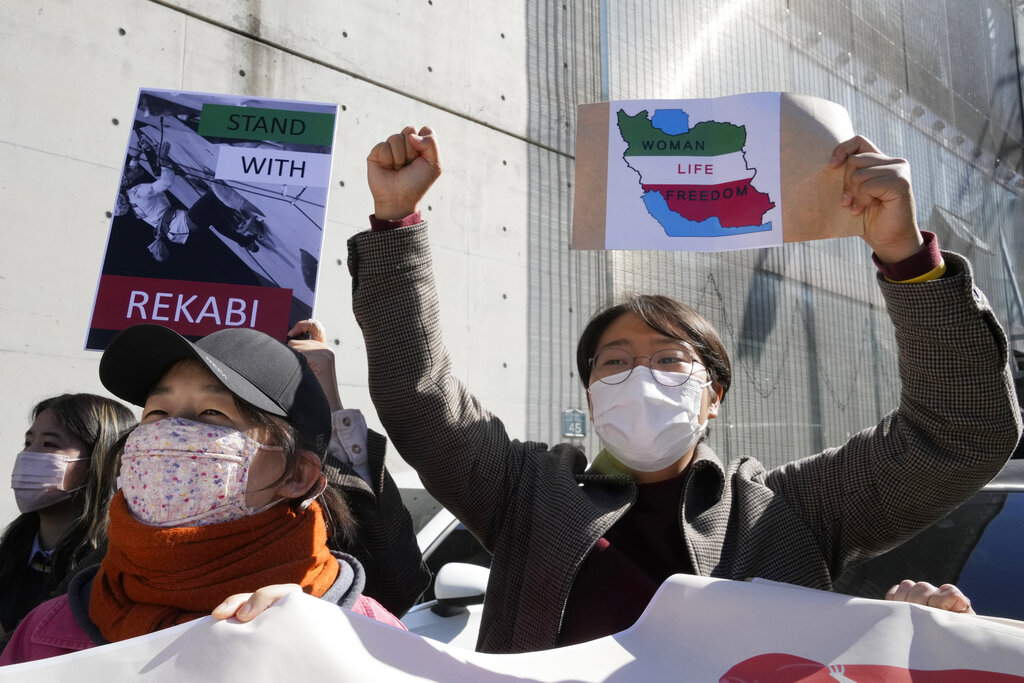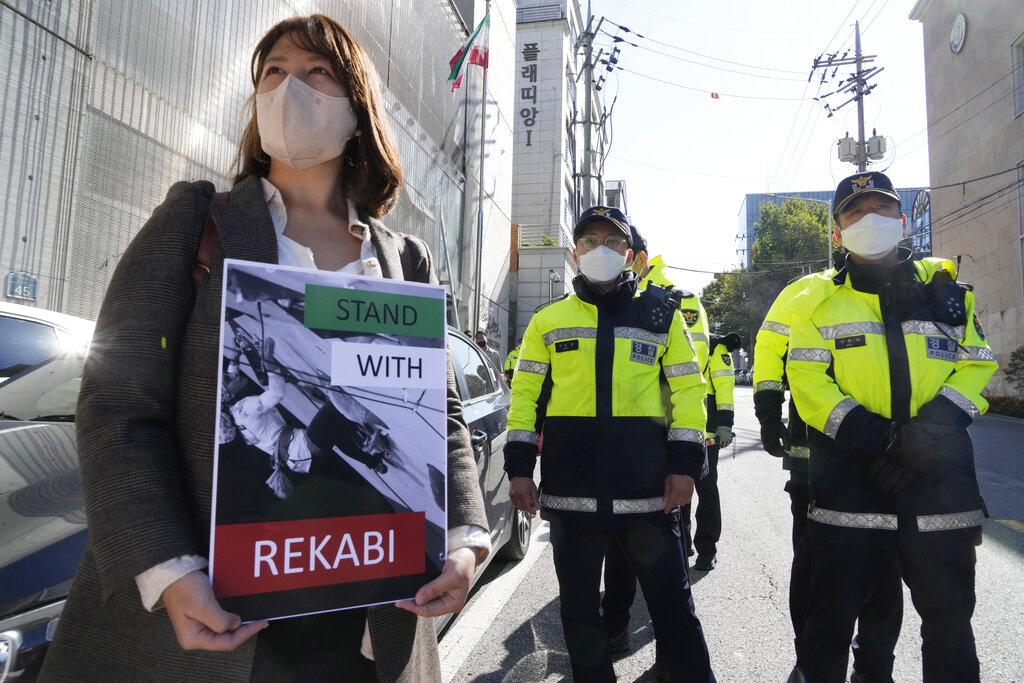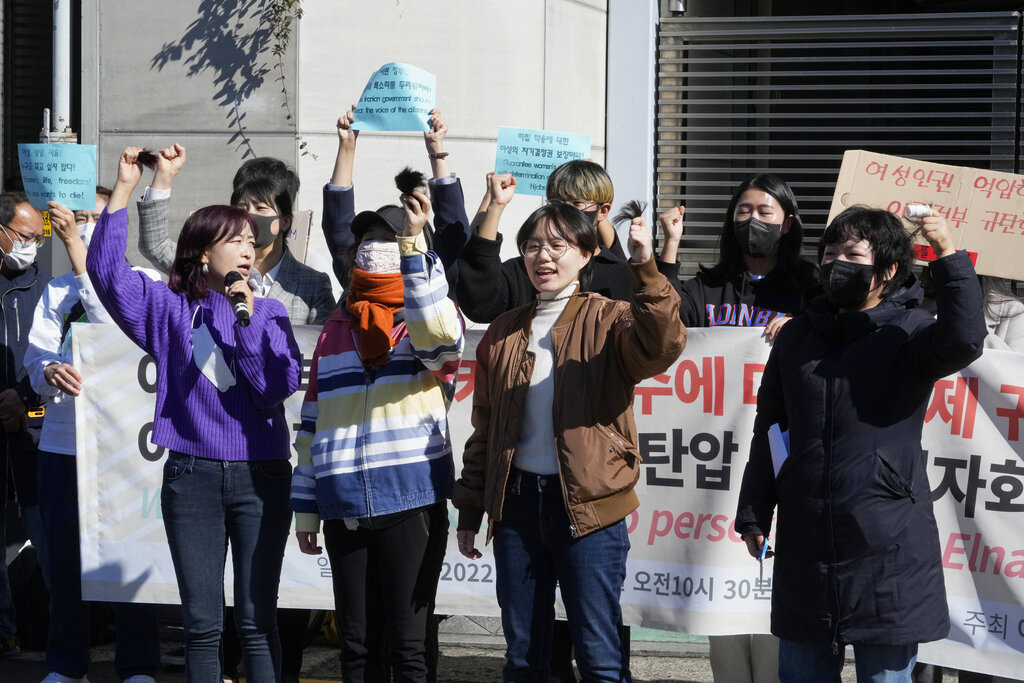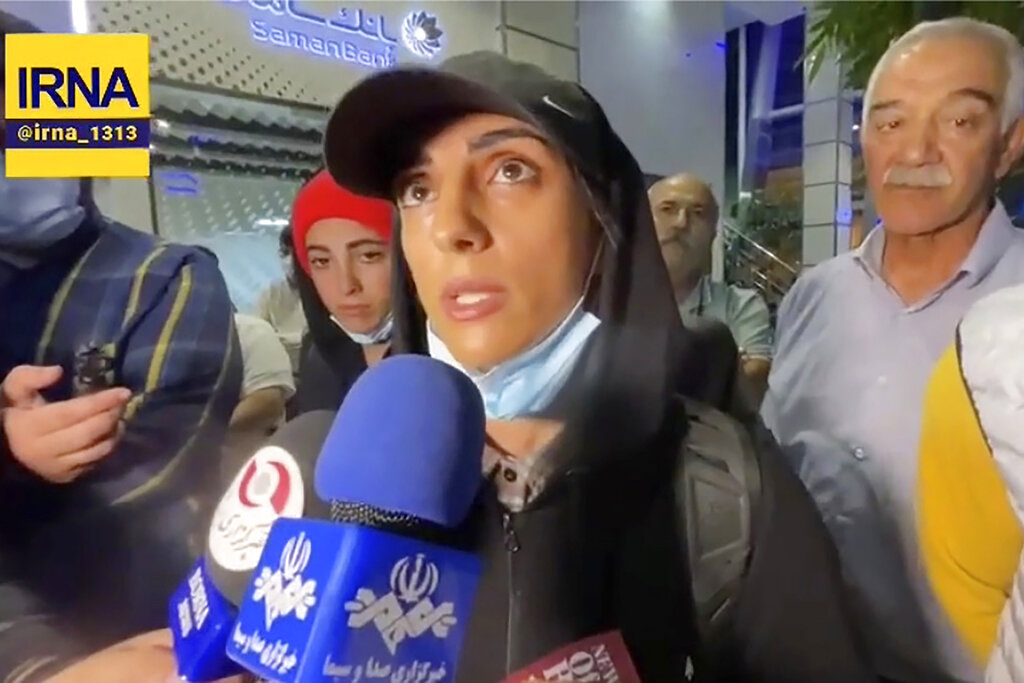Iran’s Elnaz Rekabi, who competed without hijab, in Tehran

In this image taken from video by Iran’s state-run IRNA news agency, Iranian competitive climber Elnaz Rekabi speaks to journalists in Imam Khomeini International Airport in Tehran, Iran, Wednesday, Oct. 19, 2022. Rekabi received a hero’s welcome on her return to Tehran early Wednesday, after competing in South Korea without wearing a mandatory headscarf required of female athletes from the Islamic Republic. Rekabi has described her not wearing a hijab as “unintentional” after Farsi-language media abroad raised concerns about her safety. (IRNA via AP)
DUBAI, United Arab Emirates (AP) — Iranian competitive climber Elnaz Rekabi received a hero’s welcome on her return to Tehran early Wednesday, after competing in South Korea without wearing a mandatory headscarf required of female athletes from the Islamic Republic.
Rekabi’s decision not to wear the hijab while competing Sunday came as protests sparked by the Sept. 16 death in custody of a 22-year-old woman have entered a fifth week. Mahsa Amini was detained by the country’s morality police over her clothing — and her death has seen women removing their mandatory hijabs in public.
The demonstrations, drawing school-age children, oil workers and others to the street in over 100 cities, represent the most-serious challenge to Iran’s theocracy since the mass protests surrounding its disputed 2009 presidential election.
Supporters and Farsi-language media outside of Iran have worried about Rekabi’s safety after she chose to compete without the hijab.
Rekabi on Wednesday repeated an explanation posted earlier to an Instagram account in her name that described her not wearing a hijab as “unintentional.” The Iranian government routinely pressures activists at home and abroad, often airing what rights group describe as coerced confessions on state television — the same cameras she addressed on her arrival back home.
Video shared online showed large crowds gathered early Wednesday at Imam Khomeini International Airport outside of Tehran, the sanctioned nation’s main gateway out of the country. The videos, corresponding to known features of the airport, showed crowds chanting the 33-year-old Rekabi’s name and calling her a hero.
She walked into one of the airport’s terminals, filmed by state media and wearing a black baseball cap and a black hoodie covering her hair. She received flowers from an onlooker, and then repeated what had been posted on Instagram that not wearing the hijab was “unintentional” and her travel had been as previously planned.
Rekabi described being in a women’s only waiting area prior to her climb.
“Because I was busy putting on my shoes and my gear, it caused me to forget to put on my hijab and then I went to compete,” she said.
She added: “I came back to Iran with peace of mind although I had a lot of tension and stress. But so far, thank God, nothing has happened.”
Outside, she apparently entered a van and slowly was driven through the gathered crowd, who cheered her. It wasn’t clear where she went after that.
Rekabi left Seoul on a Tuesday morning flight. The BBC’s Persian service, which has extensive contacts within Iran despite being banned from operating there, quoted an unnamed “informed source” who described Iranian officials as seizing both Rekabi’s mobile phone and passport.
BBC Persian also said she initially had been scheduled to return on Wednesday, but her flight apparently had been moved up unexpectedly.
IranWire, another website focusing on the country founded by Iranian-Canadian journalist Maziar Bahari who once was detained by Iran, alleged that Rekabi would be immediately transferred to Tehran’s notorious Evin Prison after arriving in the country. Evin Prison was the site of a massive fire this past weekend that killed at least eight prisoners.
In a tweet, the Iranian Embassy in Seoul denied “all the fake, false news and disinformation” regarding Rekabi’s departure. But instead of posting a photo of her from the Seoul competition, it posted an image of her wearing a headscarf at a previous competition in Moscow, where she took a bronze medal.
Rekabi didn’t put on a hijab during Sunday’s final at the International Federation of Sport Climbing’s Asia Championship.
Rekabi wore a hijab during her initial appearances at the one-week climbing event. She wore just a black headband when competing Sunday, her dark hair pulled back in a ponytail; she had a white jersey with Iran’s flag as a logo on it.
Footage of the competition showed Rekabi relaxed as she approached the climbing and after she competed.
Iranian women competing abroad under the Iranian flag always wear the hijab.
“Our understanding is that she is returning to Iran, and we will continue to monitor the situation as it develops on her arrival,” the International Federation of Sport Climbing, which oversaw the event, said in a statement. “It is important to stress that athletes’ safety is paramount for us and we support any efforts to keep a valued member of our community safe in this situation.”
The federation said it had been in touch with both Rekabi and Iranian officials, but declined to elaborate on the substance of those calls when reached by The Associated Press. The federation also declined to discuss the Instagram post attributed to Rekabi and the claims in it.
South Korea’s Foreign Ministry acknowledged the departures of the Iranian athlete and her team from the country without elaborating. On Wednesday, a small group of protesters demonstrated in front of Iran’s Embassy in Seoul, with some women cutting off locks of their hair like others have in demonstrations worldwide since Amini’s death.
So far, human rights groups estimate that over 200 people have been killed in the protests and the violent security force crackdown that followed. Iran has not offered a death toll in weeks. Demonstrations have been seen in over 100 cities, according to the group Human Rights Activists in Iran. Thousands are believed to have been arrested.
Gathering information about the demonstrations remains difficult, however. Internet access has been disrupted for weeks by the Iranian government. Meanwhile, authorities have detained at least 40 journalists, according to the Committee to Protect Journalists.
Iranian officials, including Supreme Leader Ayatollah Ali Khamenei, have repeatedly alleged the country’s foreign enemies are behind the ongoing demonstrations, rather than Iranians angered by Amini’s death and the country’s other woes.
Iranians have seen their life savings evaporate; the country’s currency, the rial, plummeted and Tehran’s nuclear deal with world powers has been reduced to tatters.










